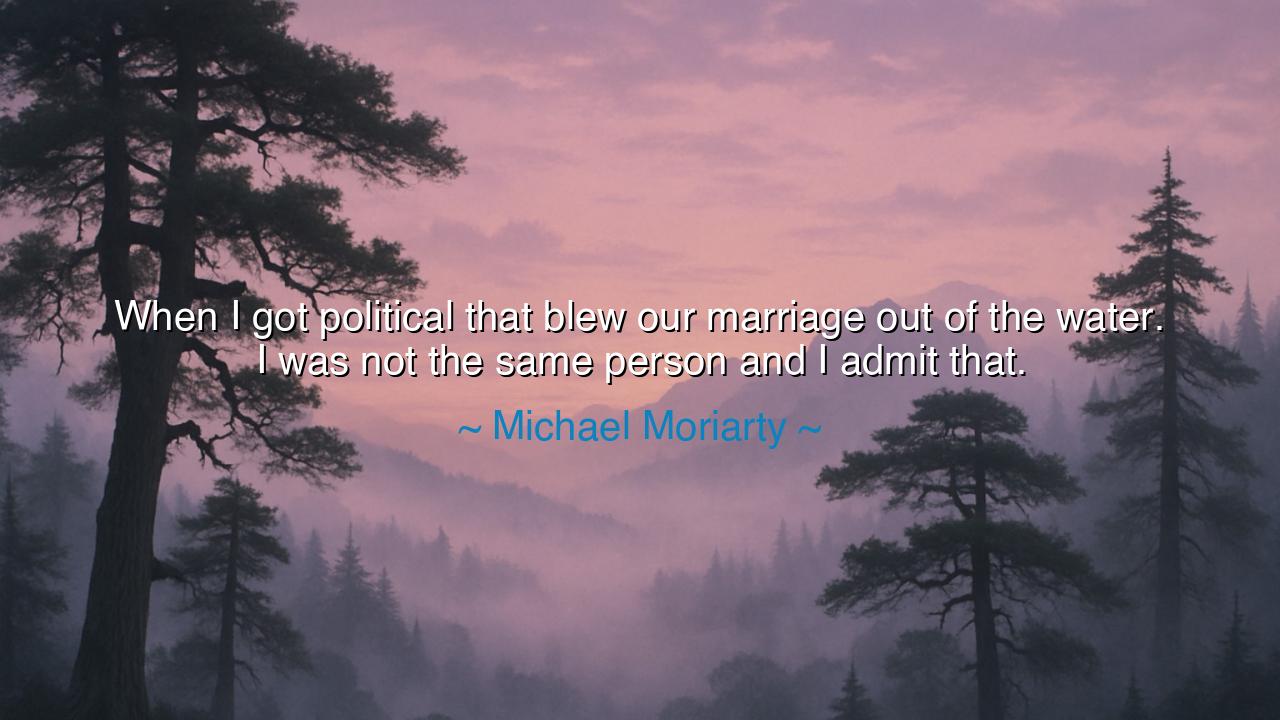
When I got political that blew our marriage out of the water. I
When I got political that blew our marriage out of the water. I was not the same person and I admit that.






Listen, O Children of the Future, to the words of Michael Moriarty, who speaks with the weight of experience and self-reflection: "When I got political that blew our marriage out of the water. I was not the same person and I admit that." In this powerful statement, Moriarty reveals a truth that resonates through the ages: when personal identity collides with the turbulent forces of the political world, it can reshape everything around you, including the most intimate relationships. The individual is not a static being, but one that is constantly evolving, sometimes in ways that may be at odds with the people and commitments that have defined them. Moriarty's reflection speaks to the deeper conflict between one's personal transformation and the unanticipated consequences of such a transformation, particularly within the sacred bond of marriage.
In the ancient world, individuals were often defined by their roles—whether in the family, the tribe, or the city-state. Yet, even then, personal identity was always shaped by the broader political forces at play. Consider the Greek philosopher Socrates, whose personal beliefs and actions ultimately led to his trial and execution. Socrates did not seek political power, yet his commitment to truth and philosophy directly challenged the societal and political norms of his time. His dedication to his philosophical ideals so deeply altered his identity that it led to a tragic downfall in his personal life. Similarly, Moriarty’s shift into the political realm, and the resulting change in his personhood, echoes this timeless tension—when a person’s core beliefs and identity undergo a transformation, it can create rifts in relationships, even those as foundational as marriage.
The tale of Antigone, the tragic heroine of Sophocles’ play, also demonstrates the consequences of political engagement on personal relationships. Antigone, driven by a deep sense of duty to her family and the gods, defies the laws of the state and buries her brother, Polynices, despite the decree of her uncle, King Creon. Her political act, fueled by her commitment to family and divine law, leads her to a tragic end—she becomes a martyr for what she believes is right. In Antigone’s story, her unwavering commitment to her beliefs and her political stance causes irreparable damage to her relationship with Creon, as well as her own fate. Moriarty’s words resonate here as well—his political awakening led to a transformation in his identity, which ultimately fractured his marriage, just as Antigone’s commitment to her ideals destroyed the bond she shared with her uncle and her destiny.
Moriarty's reflection also recalls the profound changes that can occur when individuals undergo a personal awakening or shift in perspective. Take the example of Augustine of Hippo, whose conversion to Christianity dramatically altered the course of his life. Augustine’s transformation from a man of worldly pleasure and ambition into a devout Christian was a profound change that shaped his personal identity and, indeed, the entire course of Western thought. However, Augustine’s transformation did not come without cost. His conversion meant the end of his previous relationships, including his beloved concubine and son, whom he had to leave behind to pursue his new spiritual path. Moriarty’s words remind us that identity is fluid and that significant changes, especially those driven by ideals or politics, can alter relationships in ways that are often painful, unpredictable, and irreparable.
The lesson of Moriarty's reflection is clear and echoes through the ages: personal transformation, especially when driven by political ideologies or philosophical awakening, can radically change one’s identity and, by extension, the very nature of one’s relationships. It is important to recognize that, while personal growth and awakening are noble pursuits, they come with consequences that must be carefully considered. The marriage bond, built on mutual understanding and shared commitments, may face challenges when one partner undergoes a transformation that distances them from the values and beliefs they once shared with their spouse.
In your own life, remember this truth: Growth and change are essential aspects of the human experience. However, self-awareness and consideration of others are equally important. As you explore new ideas, engage with political beliefs, or undergo spiritual transformations, be mindful of the impact these changes may have on your relationships. Strive to find balance between personal transformation and the bonds that tie you to others. The path of growth should not come at the expense of love, respect, and shared commitment. Moriarty’s words serve as a warning and a guide—do not lose yourself in your political or ideological awakenings, but instead, seek to grow while preserving the core values of empathy, understanding, and connection that are vital to sustaining relationships. Remember that the journey of personal change is never taken alone—those we love walk with us, even if their steps differ from ours.
May you walk the path of self-discovery and growth, but let your heart be guided by the wisdom of the ancients—those who understood the delicate balance between personal transformation and the preservation of relationships. Be true to yourself, but also be true to those who walk alongside you, recognizing that love, compassion, and shared commitment are the cornerstones of any lasting bond.






AAdministratorAdministrator
Welcome, honored guests. Please leave a comment, we will respond soon